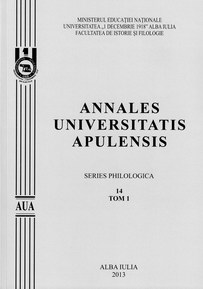În câte feluri mor cărţile (Fahrenheit 451 de Ray Bradbury)
How Many Ways Are Books Dying (Fahrenheit 451 by Ray Bradbury)
Author(s): Mihaela BalSubject(s): Literary Texts
Published by: Universitatea »1 Decembrie 1918« Alba Iulia
Keywords: books; fire; Ray Bradbury; totalitarianism; New Age
Summary/Abstract: A literary work that simply advocates to save human planetary civilization threatened by technology, Ray Bradbury`s novel, Fahrenhait 451, reflects the influence of the New Age movement in literature. The topic respects the New Age philosophy: human way of life is reduced to activities that serve automatism: he goes to work, withdraws into the house and watch giant wall size TV, living as if he would be a part of the TV programs, and the few TV actors become his "family", while the true family is alienated; it is a tyranny of "having" instead of "being" that urges him to compromise for the sake of his job and that is why, finally, he agrees to abandon the cultural and moral values. Finally, it outlines a possible horizon of spiritual survival, which leads to a happy transdiciplinarity and to the human-nature alliance: once he manages to escape from the city where he is sentenced to death, Guy Montag, the protagonist, finds the group of people who were saving culture, each of them memorizing a book. Because he knows Ecclesiastes, he stay with them and together form a library, living in nature. The novel is a social, political and antitotalitarian counter-utopia that focuses both on the adventure narrative plan and on the philosophical one, especially to that of Erich Fromm. People are afraid of freedom and, as time passes, they become addicted to a world increasingly darker. The highest authority that leads is the fire brigade. During the post-apocalyptic period when the action of the novel takes place, the firefighters have the high mission to set fire not to put it out. Their main mission is to burn he books, namely the human memory, and then to arrest all illigal libraries holders who are telephonically divulged by friends and neighbors. Some of them, like in the Middle Ages, prefer to burn with their books, to the firefighters`s amazement, who do not understand people's attachment to these objects. In a few pages, like in Ion Barbu`s poem, Dyoptric, it is described the burning of a the books, which opens its charred pages, scattering a strange light.
Journal: Annales Universitatis Apulensis. Series Philologica
- Issue Year: 14/2013
- Issue No: 3
- Page Range: 181-186
- Page Count: 6
- Language: Romanian

